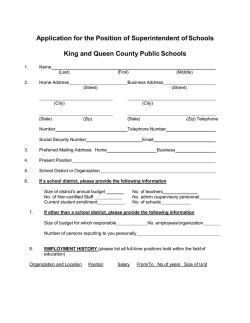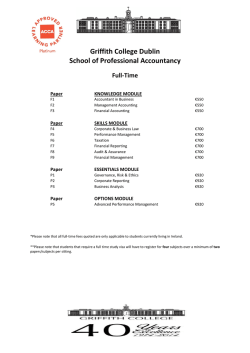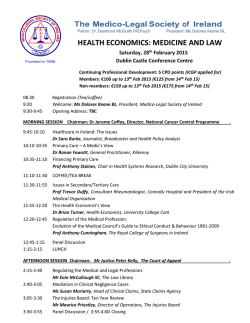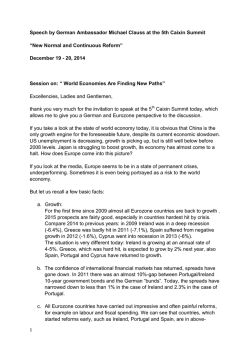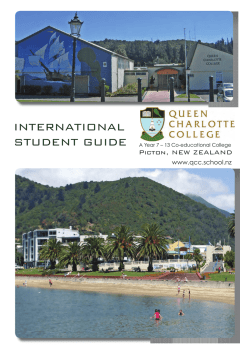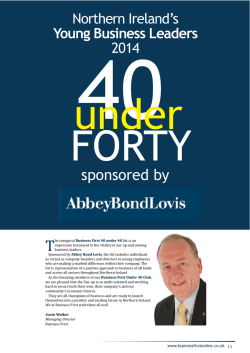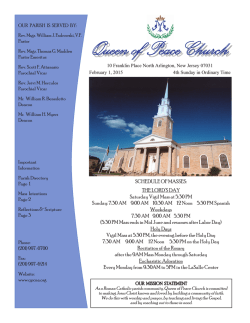
Pro-Vice-Chancellor, Arts, Humanities and Social Sciences
Appointment of Faculty Pro-Vice-Chancellor, Arts, Humanities and Social Sciences Candidate Information February 2015 RECENT ACHIEVEMENTS UNIVERSITY • Top 1 per cent of universities in the world • A UK top ten research-intensive university (REF 2014) • 26 of the 28 subject areas submitted to REF 2014 were ranked in the UK top 20 for research intensity • 17 Queen’s subjects in the UK top 20 (Complete University Guide 2015) • 20th most international university in the world 2015 (Times Higher Education) • Awarded £32m in 2012 under the UK Research Partnership Investment Fund to establish a Centre for Experimental Medicine • One of only four universities in the UK to hold an Athena SWAN Silver Institutional Award • Institute for Global Food Security established in 2013 • Five Queen’s Anniversary Prize Awards, the most recent for the Northern Ireland Comprehensive Cancer Services Programme (2012) • Five consecutive Times Higher Education Awards, including: – University Fundraising Team of the Year (2012) – Engineering Research Team of the Year (2010) – Entrepreneurial University of the Year (2009) 2 • 94 per cent of our graduates are in employment or further study six months after graduation • William J Clinton Leadership Institute at Riddel Hall established in 2012 • Research in Ionic Liquid Chemistry named “Most Important British Innovation of the 21st Century” in the Science Museum’s Initiative on Great British Innovations. WELCOME As Vice-Chancellor of Queen’s University Belfast, I am delighted you are interested in the position of Faculty Pro-Vice-Chancellor. This is an exciting time for Queen’s. The University is on a transformational journey and, over the last decade, has travelled a significant distance towards its goals. The unique and positive impact of Queen’s locally, nationally and globally is well recognised and evidenced through our key achievements. Queen’s is among the top one per cent of global universities and is a UK top ten research-intensive university. It is because of these successes that we are able to plan with even more ambition for the future. Vision 2020 marks the beginning of the next phase in our development as a world class university, and provides the framework and context for our new Corporate Plan. This is a university with an exciting future and, by working together to realise our ambitions, we will ensure that we achieve much more. If you share our vision and have the experience, skills and passion we are looking for, I encourage you to apply and to join us on our exciting journey. Professor Patrick Johnston President and Vice-Chancellor CONTENTS Executive Summary 5 Arts, Humanities and Social Sciences 14 Our Vision and Strategic Objectives 6 The Role of Faculty Pro-Vice-Chancellor 15 Investing in Excellence 7 The Person 16 Main Terms of Appointment 17 Queen’s University: Linking Northern Ireland to a Global Community 8-9 Queen’s and Northern Ireland 10 Appointment Process 17 Governance Structure 11 How To Apply 18 Key Documents 19 Management Structure 12-13 3 4 EXECUTIVE SUMMARY Queen’s is one of the leading universities in the UK and Ireland, with a distinguished heritage and history. With an annual turnover of some £300m, over 23,000 students and 3,700 staff, Queen’s plays a unique leadership role in Northern Ireland. As a member of the Russell Group of UK research-intensive universities, Queen’s combines excellence in research and education with a student centred ethos. In March 2014, Professor Patrick Johnston took up the position of President and Vice-Chancellor. Under his leadership, the University has developed Vision 2020 which was approved by Senate in October 2014. The vision for Queen’s is the development of a world class international university that supports outstanding students and staff, working in world class facilities, conducting leading-edge education and research, focused on the needs of society. A number of exciting opportunities have arisen for outstanding individuals to join the University’s senior leadership team. Three new Faculty Pro-Vice-Chancellors will play a key role in supporting the Vice-Chancellor in the academic leadership and management of the University. The successful candidates, internationally recognised for their research and scholarship, will have extensive leadership and management experience and a proven track record of success in leading and delivering strategic objectives. They will demonstrate the ability to successfully lead change across the institution and have the passion to create a high quality, world leading institution which beneficially impacts on society. 5 OUR VISION AND STRATEGIC OBJECTIVES The Vision for Queen’s is to be a world class international university that supports outstanding students and staff, working in world class facilities, conducting leading-edge education and research, focused on the needs of society. The 2011-16 Corporate Plan identifies four strategic priorities as set out below: • To offer an exceptional student experience and high quality education, leading to distinctive graduates with a sense of pride in their University • To enhance internationally recognised, globally competitive and sustainable research areas • To grow an efficient, effective and sustainable enterprise • To develop global citizens and address global challenges, that will enrich the community and enhance the global reputation of the University and Northern Ireland. 6 In October 2014, Vision 2020 was approved by Senate and marked the beginning of a new phase in Queen’s journey. Underpinning Vision 2020 is the development of an ambitious culture that seeks to embrace collective leadership, innovation, transparency and an adaptive approach to change. • Creating empowered and accountable Faculties. Our Vision is shaped by a number of principles: • Enhancing our positive impact on society. • Developing a culture of integrated, empowered and enabled leadership. • Becoming more financially independent and growing in key priority areas, including research income and postgraduate and international student numbers. • Developing and implementing Academic Standards that align with Vision 2020. • Facilitating and enabling interdisciplinarity and a collaborative approach to delivery. • Creating a Graduate School and growing a strong and vibrant postdoctoral community. INVESTING IN EXCELLENCE Financial stability underpins the work of the University as it moves forward with the development of a new Corporate Plan, embracing the ambition of Vision 2020. Queen’s had a successful year in 2013-14 with a surplus generated of £14.1m and net assets at 31 July 2014 of £516.7m. The University is well positioned to meet the challenges currently facing the sector. Its primary financial objective is to generate surpluses sufficient to sustain its ongoing activities and to maintain the necessary investment in its estate and associated infrastructure. It has a successful track record in delivering against this objective and is one of the financially strongest in the UK, with a broad range of income streams from public and private sources. The University continues to invest in its staff, students and infrastructure through the Integrated Operating Plan. A summary of the University’s consolidated income and expenditure position is set out in the table below. 2011-12 £m 2012-13 £m 2013-14 £m Income 282.7 286.1 298.4 Expenditure 267.8 274.7 283.5 Surplus before taxation 14.9 11.4 14.9 Taxation and other charges (0.7) (0.7) (0.8) Surplus retained in general funds 14.2 10.7 14.1 £850M QUEEN’S HAS AN ANNUAL BUDGET OF £300M. OUR TOTAL IMPACT ON THE LOCAL ECONOMY IS £850M 7 QUEEN’S UNIVERSITY: LINKING NORTHERN IRELAND TO A GLOBAL COMMUNITY The successful candidate will join a university that has a rich and distinguished heritage and holds a special place in the history of education, research and innovation on these islands. Queen’s is a dynamic and diverse institution with over 600 international staff, from more than 75 different countries, engaged in a variety of roles across the campus. The University was established in 1845 as part of the federal Queen’s University of Ireland with Colleges in Belfast, Galway and Cork, and was awarded independent degree awarding powers in 1908 when it became a university in its own right. It is one of the oldest universities in the UK: only nine can claim longer lineage. Today, Queen’s is a dynamic, innovative 21st century institution, a member of the Russell Group of the UK’s 24 leading research-intensive universities, educating students for the modern world and making a difference to people’s lives. 8 This was externally validated in 2012 when we received, from Her Majesty the Queen, the Diamond Jubilee Queen’s Anniversary Prize for our leadership of the Northern Ireland Comprehensive Cancer Services Programme. This was the fifth Queen’s Anniversary Prize secured by the University, the others being for Green Chemistry, Environmental Research, Palaeoecology and Law. the improvement of cancer services in Northern Ireland has resulted in the creation of a comprehensive cancer centre and significantly improved rates of cancer survival. Five prestigious Times Higher Education Awards further recognise the University’s contribution to society. These accolades reflect Queen’s spirit of innovation and invention. Queen’s work in green chemistry, in partnership with Fortune 500 company Petronas, is revolutionising the chemical processing industry around the world. In the arts, the Seamus Heaney Centre for Poetry, home to many leading contemporary poets, underpins the University’s reputation as a world literary force. From new treatments for life-threatening diseases to protecting the lives and livelihoods of some of the poorest people on the planet, the University’s research impacts on society around the globe. Its technology will provide arsenic-free drinking water for over 70 million people in South-East Asia, while the Queen’s-led programme for In the University’s Centre for Secure Information Technologies, world class researchers are working to protect global society against cybercrime. Global networks are critical to Queen’s future success. Its researchers work closely with universities around the world and the University is committed to enhancing these links still further. Amongst its dynamic partnerships are academic links with leading institutions in India, Malaysia, and the Americas. Queen’s has recently established China Medical College - Queen’s University Joint College (CQC), a joint venture to deliver cutting-edge education in Pharmaceutical Sciences, based in Shenyang. Entrepreneurship is the lifeblood of Queen’s. More than 60 businesses have emanated from the University’s cutting-edge research, generating over 1,500 high-value jobs. Queen’s is ranked No.1 in the UK for its participation in Knowledge Transfer Partnerships, which enables small and medium sized enterprises to access the skills and expertise within academic institutions. Our students, recruited from more than 80 countries, create an environment in which enterprise can flourish, and Queen’s graduates are much sought after by all employers, including bluechip companies and firms in the City of London. Our annual impact on the Northern Ireland economy is £850m and our impact on society is immeasurable. Our researchers address global challenges, whilst our students gain the skills which are necessary to underpin future economic growth. Our graduates are role models at home and ambassadors for Northern Ireland abroad. Among our alumni we number two Nobel laureates – the politician David Trimble and the late poet, Seamus Heaney. Both also served as members of staff. We are also proud of our Queen’s graduate John Stewart Bell, widely regarded as one of the most influential scientists of the twentieth century. The former Irish President, Mary McAleese, was a Queen’s Pro-Vice-Chancellor when she was elected to office. £350M OVER THE PAST TEN YEARS, QUEEN’S HAS INVESTED £350M IN ITS CAMPUS, GENERATED 7,000 CONSTRUCTIONRELATED JOBS AND PUT £1BN INTO THE WIDER ECONOMY 9 QUEEN’S AND NORTHERN IRELAND Belfast is the capital of Northern Ireland and is one of Europe’s most friendly and fashionable regional cities. Described by Lonely Planet as a ‘must-see visitor destination’, it was also voted one of the world’s top 10 destinations by National Geographic Traveller in 2012. Northern Ireland is renowned for its beautiful beaches and coastal scenery, including the Giant’s Causeway, a World Heritage site. It has a fascinating history and cultural heritage and prides itself in many ‘firsts’, including having built the Titanic. Many visitors to Northern Ireland have chosen to make the region their home. People from all over the world are now making an important contribution to life here – in medicine, business, industry, and education. 10 Travelling to and from Northern Ireland is both easy and economical. Most major British cities are within an hour’s flying time from Belfast’s two regional airports, which are both easily accessible from the University. These airports provide flights from many locations in the UK and mainland Europe as well as direct services from North America. Belfast has regular ferry services from Scotland and England, and Dublin is just a two-hour train journey away. Queen’s University is proud to be a driving force in Northern Ireland’s cultural, artistic and economic renaissance, celebrating the innovation and creativity of its people and enhancing its reputation as an international centre of learning. GOVERNANCE STRUCTURE Senate, the University’s Governing Body, comprises lay and academic persons appointed under the Statutes of the University, the majority of whom are non-executive. Senate is responsible for the ongoing strategic direction of the University, while the Executive Officers are responsible for the operational management of the institution. Senate approves all major developments and receives regular reports on the day-today activities of the University and its subsidiary companies. Senate meets at least four times a year and is supported by a number of key Committees, including Academic Council, the Planning and Finance Committee, the Remuneration Committee and the Audit Committee. Academic Council, which is chaired by the President and Vice-Chancellor, is responsible, under delegated authority, for the academic affairs of the University, with the Education Committee and the Research and Postgraduate Committee reporting to it. All of the Committees are formally constituted with Terms of Reference and include staff and lay members of Senate. SENATE UNIVERSITY EXECUTIVE BOARD PLANNING AND FINANCE COMMITTEE UNIVERSITY OPERATING BOARD INVESTMENT COMMITTEE ACADEMIC COUNCIL STANDING COMMITTEE REMUNERATION COMMITTEE AUDIT COMMITTEE HEALTH AND SAFETY MANAGEMENT GROUP 11 MANAGEMENT STRUCTURE Professor Patrick Johnston took up the position of President and Vice-Chancellor, on 1 March 2014. Arising out of Vision 2020, a detailed review of management structures is underway to ensure that structures will support and facilitate the delivery of this challenging new Vision. The President and Vice-Chancellor is supported by the Registrar and Chief Operating Officer and also by three Pro-Vice-Chancellors, each with defined policy portfolios, as outlined below. 1. Education and Students Education strategy; teaching and learning; quality assurance and related issues for all education and skills activities; employability strategy; widening participation; library, computing and other relevant academic services; student services. 2. Academic Planning, Staffing and External Relations Academic planning; strategic planning, including relevant estates, financial and human resource issues; staffing matters; and external relations. 7,200 WITH 3,700 STAFF, QUEEN’S IS ONE OF THE LARGEST EMPLOYERS IN BELFAST AND GENERATES A FURTHER 3,500 JOBS ACROSS NORTHERN IRELAND 12 3. Research and Postgraduates Research strategy; research quality management; postgraduate strategy. Overall responsibility for issues relating to postgraduate research and taught students. The Registrar and Chief Operating Officer is the head of a unified administration, responsible for managing, leading and co-ordinating the provision of a comprehensive range of professional support services. These integrated professional services are delivered through eight Directorates. On the academic side, there are 20 Schools within three Faculties, each currently led by a Dean. As part of the review of structures set out in Vision 2020, Faculties will be led by a Faculty Pro-Vice-Chancellor (PVC), with the support of a Faculty Executive Board. The Faculty PVC will become the budget holder for the Faculty, and will be supported in this role by the appointment of a Director of Operations. The President and Vice-Chancellor chairs the University Executive Board (UEB), which is responsible for developing the Corporate Plan, as well as approved strategies to support its delivery. Current membership of the UEB, which reports directly to the Planning and Finance Committee, is made up of the Registrar and Chief Operating Officer, the ProVice-Chancellors, the Deans and the Director of Finance. The newly appointed Pro-Vice-Chancellors will be key members of the UEB. The Registrar and Chief Operating Officer chairs the University Operating Board (UOB), which is responsible for overseeing the implementation of all University strategies and policies. Membership of the UOB, which reports directly to the UEB and the Planning and Finance Committee, is currently made up of the three Deans and the eight Directors. In the new structure, the Faculty Pro-Vice Chancellors will replace the Deans as key members of the UOB. President and Vice-Chancellor Pro-Vice-Chancellors Registrar andChief Operating Officer • Academic Planning,Staffing and External Relations • Education and Students Dean of the Graduate School • Research and Postgraduates Directors Academic and S tudent Affairs Faculty Pro-Vice-Chancellor Arts, Humanities and Social Sciences Faculty Pro-Vice-Chancellor Medicine, Health and Life Sciences Heads of School Heads of School Heads of School Creative Arts Chemistry and Chemical Engineering Biological Sciences Development and A lumni Relations Education Estates English Finance History andAnthropology Human Resources Law Information Services Modern Languages Research and Enterprise Politics, International Studies and Philosophy Student Plus Faculty Pro-Vice-Chancellor Engineering and Physical Sciences Sociology, SocialPolicy and Social Work Queen’s University Management School Electronics, Electrical Engineering and Computer Science Geography, Archaeology and Palaeoecology Medicine, Dentistry and Biomedical Sciences Nursing and Midwifery Pharmacy Mathematics and Physics Mechanical and Aerospace Engineering Planning, Architecture and Civil Engineering Psychology William J Clinton Leadership Institute 13 ARTS, HUMANITIES AND SOCIAL SCIENCES The Faculty of Arts, Humanities and Social Sciences (AHSS) is a multidisciplinary Faculty, with nine Schools, two interdisciplinary Research Institutes and two teaching Institutes. The Faculty has over 600 staff, of which 400 are established academic posts. The student population of over 7,600 continues to grow. Of the 12 Units from AHSS submitted to REF 2014, 10 were ranked in the top quartile for research intensity for their field, with 92 per cent of the Faculty submission rated as world leading or internationally excellent. The Faculty has world class facilities including: the world’s only Sonic Arts Research Laboratory; a £14m state of the art building at Riddel Hall, which is home to the Management School, including a unique Trading Room, and the William J Clinton Leadership Institute; the Seamus Heaney Centre for Poetry within the School of English; and a purpose built ‘Black Box’ for Drama and Film Studies, as well as the Brian Friel Theatre. In addition to this, the Faculty will also benefit from a £20m investment in a new School of Law building, which is due for completion in summer 2016. AHSS has a number of critically acclaimed staff, in all subject areas. Some notable examples include: • D r Sinéad Morrissey (the First Poet Laureate of Belfast, and winner of the 2013 T.S. Eliot Prize) • Professor Phil Scraton (Lead Researcher and Member of the Hillsborough Independent Panel) • Professor Paul Bew (Appointed as 14 House of Lords Peer in recognition of his contribution to the Northern Ireland Peace Process) • P rofessor Keith Jeffery (appointed as the author of the first Official History of the British Secret Intelligence Service) • P rofessor Chris McCrudden FBA (a leading expert in Human Rights, who has also acted as a Specialist Adviser to the House of Commons Northern Ireland Affairs Select Committee) Over 25 subjects are offered at undergraduate level, including English and Creative Writing, History, International Politics and Conflict Studies, Law, International Business, Actuarial Studies, Languages, Music Technology and Criminology. The Faculty also offers leading and innovative postgraduate taught progammes, including Arts Management, Children’s Rights, Broadcast Literacy, JD (Juris Doctor), Translation, Interpreting, and Violence, Terrorism and Security. Distinctive programmes around the broad themes of Conflict and the Humanities, which connect our undergraduate offerings with the Faculty research strengths are available. Many of the Faculty’s subjects feature in the QS Global Rankings, with History, Politics, English and Law all having been included in the Top 100. Many of the Faculty’s Research Strengths are clustered around two recently established centres of excellence: Institute for Collaborative Research in the Humanities and the Institute for the Study of Conflict Transformation and Social Justice. These Institutes foster collaborations across a range of subject areas which allow the Faculty to address some of the key global challenges faced in seeking to achieve fairness, security, prosperity, and social harmony and progress. There are many other areas of excellence including Creative Writing, Sonic Arts, Global Financial Markets, Children’s Well-being, Poverty and Social Exclusion, Translation and Interpreting, and Shared Education, all investigated on a local and global scale. The William J Clinton Leadership Institute at Riddel Hall brings world class facilities, leading academics and industry experts together to deliver a high end portfolio of executive education and leadership programmes. The Faculty is a partner with Newcastle University and Durham University in the Northern Bridge Doctoral Training Partnership for AHRC Block Grant Studentship Awards. There are also numerous Institutional Partnerships which have benefitted staff and student exchanges across the globe. The Faculty has international collaborations with a number of institutions including the University of Malaya, Vanderbilt University, the University of Notre Dame, the University of São Paulo, Minzu University of China, the University of Hyderabad and Shenzhen University. THE ROLE OF FACULTY PRO-VICE-CHANCELLOR The University is seeking to recruit three Faculty Pro-Vice-Chancellors who will support the Vice-Chancellor in the academic leadership and management of the University. The Faculty Pro-Vice-Chancellors will play a key role in the continued success of the University. A member of the University Executive Board, they will have responsibility for shaping the corporate direction of the University and for delivering key strategic priorities. They will have strategic responsibility for the Faculty, providing leadership, innovation and direction to deliver its contribution to Vision 2020. The Faculty Pro-Vice-Chancellor will build and lead the Faculty Executive Board, responsible for planning and delivering the approved Faculty targets. • E xpanding postgraduate recruitment based on a reputation for excellence. Across the Faculty, the Pro-ViceChancellor will be responsible for: • Building and developing both existing and new interdisciplinary activities across the Faculty and the University. • Embedding the drive, ambition and capabilities required to excel in teaching and research. • A llocating significant resources to support the delivery of the Faculty Plan. • S trengthening and developing international activities and reputation. • A cting as an advocate of the University, developing strategic partnerships locally, nationally and internationally. 15 THE PERSON The Faculty Pro-Vice-Chancellor must be a professor who is committed to playing a leadership role in the delivery of Vision 2020. Candidates must be able to demonstrate the following skills, abilities, personal motivation and experience: • International academic standing in a discipline relevant to the Faculty as evidenced by levels of grant income, a sustained high quality publication record and PhD supervision. • A senior leader with credibility within the academic community and a proven track record of leading and delivering a strategic vision. • Proven track record of the successful management of financial, human and physical resources. • Experience of successfully leading change in a large complex organisation. • Has experience in, and a passion for, delivering high quality research and education by setting challenging academic standards. • A strong advocate with the ability to build productive relationships locally, nationally and internationally. • Passion, determination and personal resilience. 23,000 QUEEN’S HAS CURRENTLY SOME 23,000 STUDENTS, INCLUDING: 18,000 UG, 3,500 PGT AND 1,500 PGR 16 MAIN TERMS OF APPOINTMENT The role of Faculty Pro-Vice-Chancellor is available for five years in the first instance, with the possibility of renewal for one further five year term. At the conclusion of the term of office as a Pro-Vice-Chancellor, the successful candidate will be based within the appropriate academic School. The successful candidate will have a substantive and permanent professorial appointment in an academic School in order to maintain their academic profile and research interests. It is hoped that the successful candidate will be able to take up the post of Faculty Pro-Vice-Chancellor as soon as possible, subject to existing contractual obligations. The Faculty Pro-Vice-Chancellor is based within the Faculty and will receive administrative and secretarial support in carrying out the requirements of the office. An attractive remuneration package, commensurate with the seniority and responsibilities of the role, will be provided as well as a generous relocation package and support as appropriate. The successful candidate will also be eligible to join the Universities Superannuation Scheme (USS). The Faculty Pro-Vice-Chancellor will be required to travel on a national and international basis. APPOINTMENT PROCESS Queen’s University Belfast has engaged the services of Odgers Berndtson, to whom applications should be sent by the closing date of Monday 2 March. An indicative time line for the recruitment is given below. Queen’s is committed to ensuring that all applicants are afforded equality of opportunity and that there should be no unlawful discrimination, either direct or indirect, in our selection process. Key Dates Closing date Monday 2 March Candidates notified whether required for interview Friday 20 March Preliminary interviews with Odgers Berndtson w/c 23 March, w/c 30 March and w/c 6 April Candidate notified whether required for final panel By Friday 17 April Informal meetings with Queen’s University Belfast w/c 20 April Final panel interviews with Queen’s University Belfast Thursday 30 April 17 HOW TO APPLY In order to apply, please submit a comprehensive curriculum vitae with a covering letter setting out your interest in the role and details of how you match the required criteria in the Person Specification. Please include current salary details and the names and contact details of three referees. Referees will not be approached until the final stages and not without prior permission from candidates. Please apply online at www.odgers.com/50864 if you are unable to apply online please email your application to [email protected]. All applications will receive an automated response. All candidates are also requested to complete an online Equal Opportunities Monitoring Form. This can be found online at www.odgersberndtson.co.uk/gb/eom-50864/ For informal enquiries, please contact in confidence: Fatima Koumbarji: + 44 (0)20 7529 6360 Edwina Purcell: + 44 (0)20 7529 1104 18 KEY DOCUMENTS To help you learn more about Queen’s University, a comprehensive range of publications is available through the links below: • Towards Vision 2020 • Welcome to our Future: Queen’s University Corporate Plan 2011-16 • Vice-Chancellor’s Annual Report 2013-14 • Financial Statements 2013-14 • Our Commitment to You: Students’ Union Strategic Plan 2012-15 • Together We Can Go Beyond: Fundraising Campaign • The DNA of Innovation – Volumes 1-4 19 CDS 124295
© Copyright 2026
